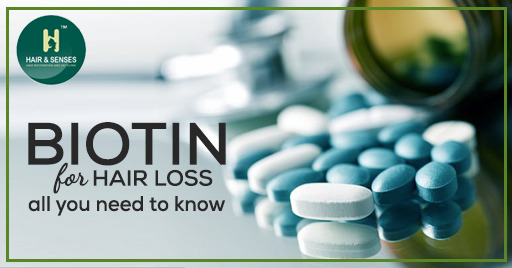Biotin for hair loss: all you need to know
Oct, 08 2019 | By Dr. Satinder Singh & Dr. Sangay Bhutia (Hair Transplant Specialist in Delhi)

Biotin as a supplement has gained lots and lots of popularity owing to the claims that it is beneficial for growth and maintenance of healthy hairs. It has become a new trend for the consumers who wish to have healthy hairs, skin and nails as it can be readily incorporated in cosmetic products and that too without much cost.
Biotin is a member of Vitamin B complex and it is called Vitamin B7 and Vitamin H for "Haar und Haut", which means "hair and skin" in German. Like all Vitamin B it is also water soluble.
Biotin is an essential factor that assist various metabolic pathways involved in fatty acid synthesis, branched-chain amino acid metabolism, and gluconeogenesis. We all know that protein is essential for the formation and growth of the hair. The specific protein required is keratin. The role of biotin in protein synthesis and more specifically, in keratin production, explains its importance in growth of healthy hair.
The deficiency of biotin can be congenital or it can be acquired. Although it is not very common, still one should know what can happen if it is deficient.
The signs of deficiency include:
- Hair loss and a scaly red rash around the eyes, nose and mouth.
- There may be some neurological symptoms in adults have included depression, lethargy, hallucinations, numbness and tingling of the extremities and ataxia.
- The characteristic facial rash, together with unusual facial fat distribution, has been termed as "biotin deficient facies".
Generally, problems with hair and skin appears early and neurological symptoms occurs with severe deficiency.
Biotin deficiency is found to be rare because intestinal bacteria produce biotin more than the body's daily requirements. Moreover, biotin is consumed from a wide range of food sources in the diet although a few are particularly rich sources. Egg yolk and liver are rich source of biotin.
Other foods which contain biotin are:
- Whole wheat
- Unpolished rice
- Almonds
- Cheese
- White Mushroom
- Pork
- Salmon
- Fruits like Avocado, Banana
- Vegetables like cauliflower, spinach, lettuce.
- Nuts, legumes.
If biotin deficiency is rare then how the deficiency occurs?
The deficiency of biotin rarely occurs but there are certainly some risk factors which makes a person prone to its deficiency:
- Improper dietary intake during pregnancy and breast feeding as these states are associated with increased dietary demand.
- Eating too much raw eggs is a common cause of biotin deficiency. Raw egg white contains protein called Avidin this binds tightly to the biotin and hampers its absorption leading to its deficiency but when egg is cooked then avidin gets denatured and does not binds to biotin.
- Prolonged use of antibiotics, which impairs the normal healthy gut bacteria there by leading to its reduced formation and lack of absorption.
- Other medications which impairs biotin metabolism and uptake like medications used for seizure/fits(anticonvulsants) and medications for acne like isotretinoin.
- Chronic malnutrition, generally seen in elderly, athletes in extreme sports and persons with anorexia.
- Persons who under surgery like gastrectomy or partial gastrectomy.
- Alcoholism and smoking are also associated with biotin deficiency.
How much is the daily requirement of the biotin?
The toxicity of biotin is unknown as it is a water-soluble vitamin so excess is excreted in the urine. Current recommendation of daily adequate intake as per Institute of Medicine is as follows:
| Life stages | Age group | Male μg/day | Female μg/day |
|---|---|---|---|
| Infants | 0 – 6 months | 5 | 5 |
| Infants | 7 – 12 months | 6 | 6 |
| Children | 1 –3 years | 8 | 8 |
| Children | 4 – 8 years | 12 | 12 |
| Children | 9 – 13 years | 20 | 20 |
| Adolescents | 14 – 18 years | 25 | 25 |
| Adults | ≥19 years | 30 | 30 |
| Pregnancy | all ages | n/a | 30 |
| Breast-feeding | all ages | n/a | 35 |
Skin Appendage Disord. 2017 Aug; 3(3): 166–169.
One should understand that hair loss may be multifactorial in origin so, careful history and examination should be performed so that risk factors and symptoms of biotin deficiency can be found if present. If biotin is found to be deficient biotin supplementation is of great value otherwise very limited clinical data is available which suggest the benefit of biotin supplement in healthy individuals without its deficiency.
Study published (Skin Appendage Disord. 2017 Aug; 3(3): 166–169.)
concluded that though its use as a hair and nail growth supplement is prevalent, research demonstrating the efficacy of biotin is limited. In cases of acquired and inherited causes of biotin deficiency as well as pathologies, such as brittle nail syndrome or uncombable hair, biotin supplementation may be of benefit.
